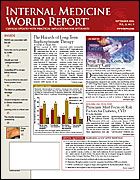Publication
Article
Internal Medicine World Report
Treatment and Prevention of Postherpetic Neuralgia
Author(s):
From the American Geriatrics Society
CHICAGO?Physicians treating older adults can turn to several therapeutic and preventive options for postherpetic neuralgia, according to data presented at the American Geriatrics Society annual meeting.
Herpes zoster infection (shingles), which results from reactivation of latent varicella zoster infection, is a disabling condition that affects a large proportion of older adults. Cell-mediated immunity, which is needed to fend off shingles, decreases with age, explains Myron Levin, MD, of the University of Colorado, which explains why "the frequency and severity of herpes zoster increase with age."
Although the blistering rash that affects 1 dermatome on 1 side of the body usually resolves in a few weeks, the pain, known as postherpetic neuralgia, can last as long as 1 year.
Physicians have used various treatments for postherpetic neuralgia, and many treat shingles with antiviral drugs, such as acyclovir (Zovirax). Although antiviral treatments may reduce pain initially, they do not work well in the long-term. According to Michael Oxman, MD, of the San Diego VA Medical Center, studies have shown that treatment with acyclovir does not prevent the chronic pain of postherpetic neuralgia, which, he said, can be "a nightmare" for older adults. ?
Kenneth E. Schmader, MD, of Duke University, Durham, NC, pointed out that oral corticosteroids do not help much either. "I think one thing we can say definitively is that [steroids] do not prevent postherpetic neuralgia." He said that 4 treatments for postherpetic neuralgia are effective. These are opiates, anticonvulsants, tricyclic antidepressants, and anesthetic nerve blocks. ?
Although no clinical trials have shown that opiates decrease the pain caused by herpes zoster, physicians have found this class of drugs to be effective for patients with moderate-to-severe postherpetic neuralgia.
The anticonvulsants gabapentin (Neurontin) and pregabalin (Lyrica) are also popular. Anesthetic nerve blocks can be very effective for acute pain. "These flat out work," said Dr Schmader. He encourages physicians to try different treatments, because patients with this condition who do not respond to 1 class of drugs may respond to a different class.
Ultimately, prevention of herpes zoster is the best treatment for ?postherpetic neuralgia. The FDA approved the first zoster vaccine, Zostavax, in May 2006. This live vaccine is given as a single injection and is indicated for the prevention of shingles in adults aged ≥60 years.
In a randomized, controlled trial of >38,000 adults aged ≥60 years, the vaccine decreased the overall incidence of herpes zoster by 51% and reduced the incidence of postherpetic neuralgia by 67%.
Participants were divided into 2 age-groups (60-69 years, and ≥70 years) and followed for an average of 3 years. "The zoster vaccine maintained its efficacy regardless of the age of the subject," said Dr Oxman. It also decreased postherpetic neuralgia pain in those who did develop shingles after being vaccinated.
While this single large trial demonstrated the short-term efficacy of the vaccine, it remains to be determined how long immunity will last after ?vaccination. Investigators will also need to determine how the frail ?elderly and nursing home residents, 2 particularly vulnerable groups, will respond to the vaccine.
Key points
Reduced immunity in older age explains why postherpetic neuralgia increases with age. ?
The devastating associated pain can last as long as 1 year, even though the blistering rash usually resolves in a few weeks.
Treatment with acyclovir does not prevent the chronic pain associated with this condition. Steroids, too, are not effective for postherpetic neuralgia
The 4 effective treatments are opiates, anticonvulsants, tricyclic antidepressants, and anesthetic nerve blocks.
The best treatment is prevention. Administer the newly approved vaccine to all your patients aged ≥60 years.






